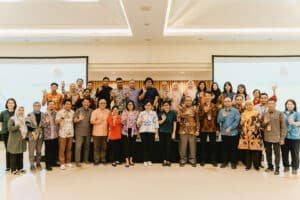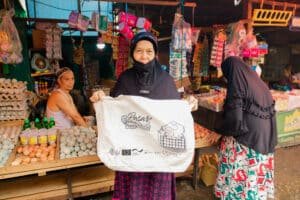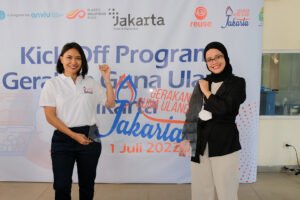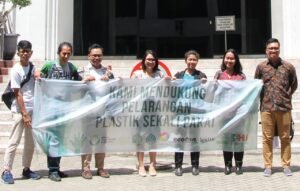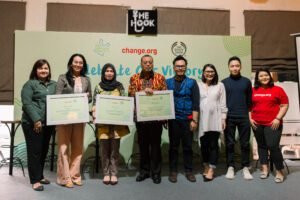Jakarta, 8th September 2020. Gerakan Indonesia Diet Kantong Plastik (GIDKP), Yaksa Pelestari Bumi Lestari (YPBB), and Aliansi Zero Waste Indonesia (AZWI) held a Plastic Free Regional Forum on September 8-9, 2020. This activity is an effort by civil society to appreciate regional initiatives in reducing the generation of plastic waste which contributes to the national target of reducing waste by 30% by 2025 and reducing plastic waste in the sea by 70% by 2025. This activity is held virtually through Zoom Webinar and YouTube.
This forum is divided into three sessions where each session raises topics that reflect a comprehensive waste reduction ecosystem. The first session was held on September 8, 2020 at 09.00 – 11.30 WIB with the topic “The Challenge of Promoting Reuse Shopping Bags”. The session was facilitated by Riyanni Djangkaru and remarks from Mr. Ujang Solihin Sidik, as Head of the Sub-Directorate of Goods and Packaging, Directorate General of Waste, Waste Management and hazardous and toxic waste (B3), Ministry of Environment and Forestry.
“So far there have been 37 cities / districts / provinces that already have regulations banning single-use plastics.”, said Mr. Ujang Solihin Sidik who also represents Mrs. Rosa Vivien Ratnawati, Director General of Waste Management, Waste, and hazardous and toxic waste (B3), Ministry of Environment and Forestry as chairman of the Implementation Team of the National Action Plan on Marine Waste Management.
As a discussion lighter, this session also presented speakers from Balikpapan city and DKI Jakarta Province. Both areas represent cities with coastal areas as entrances to plastic waste in the sea. The first speaker was Mr. Suryanto as head of balikpapan city environment services. He spoke about the ecological commitment in Balikpapan city consisting of four things, namely Green Industry, Foresting the City, Adaptation and Mitigation, and Zero Waste to Landfill.
“Balikpapan City improved the status of Balikpapan Mayor Regulation No. 8 of 2018 on Reducing the Use of Plastic Bags to Balikpapan City Regional Regulation No. 1 of 2019 on Reducing The Use of Disposable Plastic Products/Packaging and Balikpapan Mayor Regulation No. 28 of 2019 on Restrictions on The Use of Disposable Plastic Products/Packaging. These regulations state that businesses are prohibited from using disposable plastic products/packaging and are obliged to provide Environmentally Friendly Alternative Bags.”, explained Mr Suryanto.
Further, in the context of promoting reuse shopping bags, he also mentioned that “There are many Micro, Small, and Medium Enterprises/Individual Business who make reuse bags, but the number is still relatively small. However, it is still difficult to pack wet meat such as fish and meat. However, we’re still trying to ask the consumer to bring plastic buckets. But for the two-wheel vehicle users it is still difficult.”
The next speaker is Mr. Yogi Ikhwan who is the Head of the Counseling and Public Relations Division of the DKI Jakarta Province Environmental Service. “The spirit of the Regulation of the Governor of DKI Jakarta Province No. 142 of 2019 concerning the Obligation to Use Environmentally Friendly Shopping Bags at Shopping Centers, Supermarkets, and Traditional Markets is a change in the behavior of using shopping bags. Single-use plastic shopping bags to reuse bags. ”. Furthermore, he also added the results of a survey conducted by GIDKP to 851 respondents who stated that, “97% of respondents said that they already knew about this regulation. 89.5% admitted that it was very easy to find the alternatives and 78, 3% mentioned that their preference for eco-friendly shopping bags are fabric bags made of canvas, calico, cotton, polyester, nylon, and others. What’s more, almost 99% already have their own shopping bags, and 86% admit that they always or often use their own bags when shopping. “
The session was closed by Ms Aufrida Herni Novieta as Deputy Secretary for Business Restructuring, Ministry of Cooperation and Small and Medium Enterprises. He communicated that. “The Micro, Small, and Medium Enterprises sector can be an opportunity to produce alternative bags or environmentally friendly packages. Besides, it can also grow creative souls that can be sold as economic potential. It can also be made a local brand using local Micro, Small, and Medium Enterprises collaborating with motive, design, and local culture in each area.”
The Plastic-Free Regional Forum will be continued at Session 2 at 13.00 – 15.00 WIB with the topic “Legal and Environmental Aspects In Planning Regulations for Reducing The Use of Single-Use Plastics” which will be facilitated by Tiza Mafira of GIDKP and will be preceded by a speech from Mr. Ujang Solihin Sidik, as Head of the Subdirection of Goods and Packaging, Directorate General of of Waste Management, Waste, and hazardous and toxic waste (B3) Ministry of Environment and Forestry (KLHK), with speakers from various sectors , namely Mr. Nyoto Suwignyo who is the Director of Regional Government Affairs Synchronization 1 Ministry of Home Affairs, Fajri Fadhillah of ICEL, and Ria Ismaria as an independent environmental consultant. Session 2 live broadcasts can be watched here.






